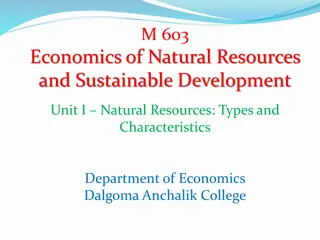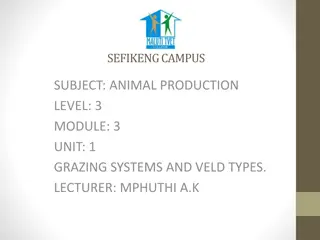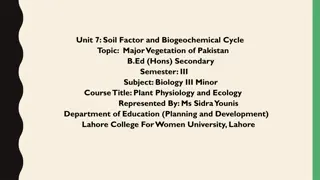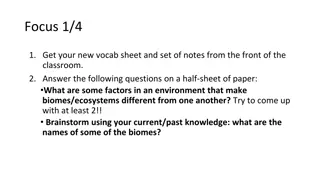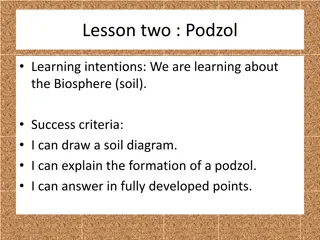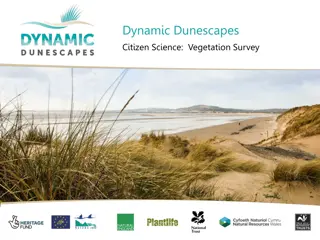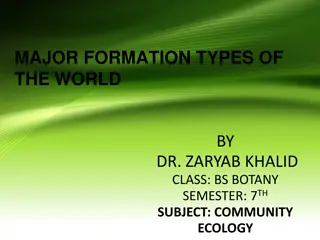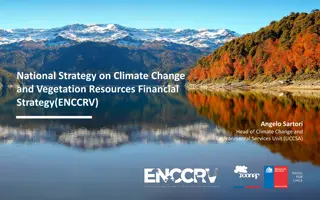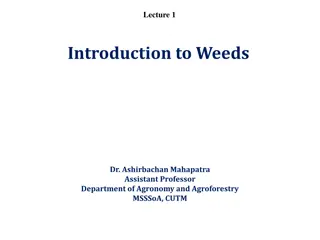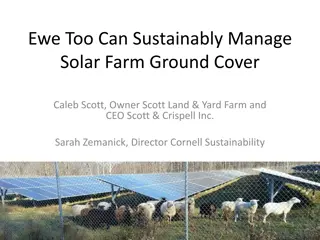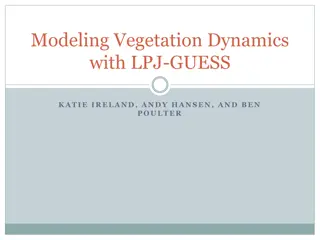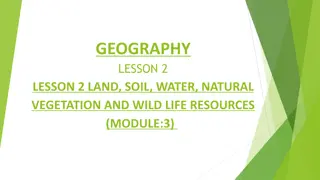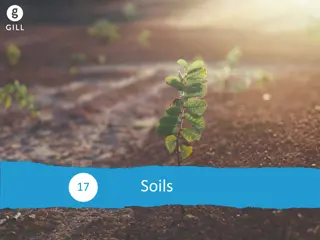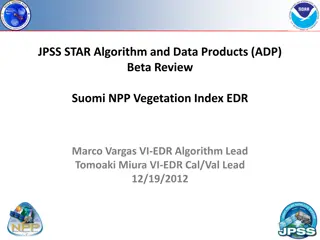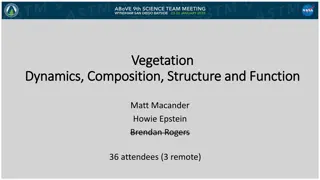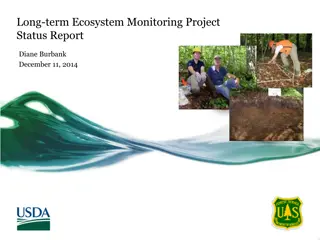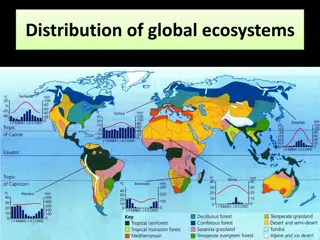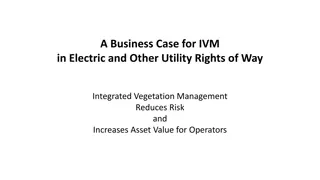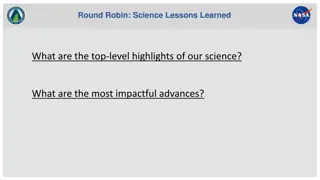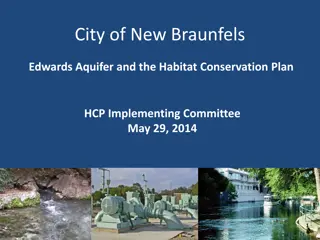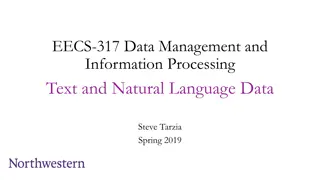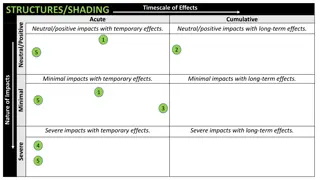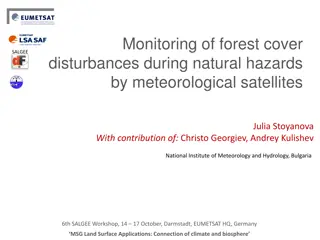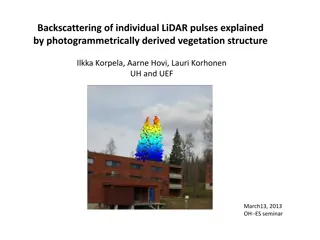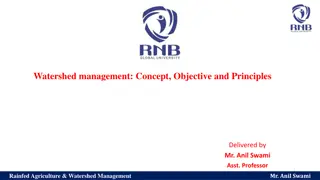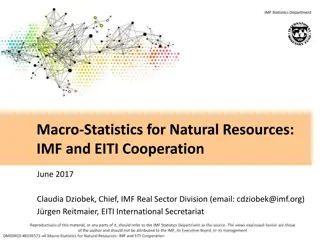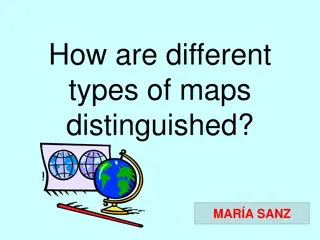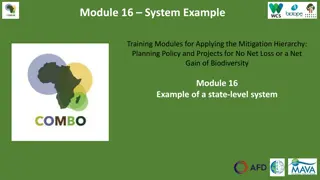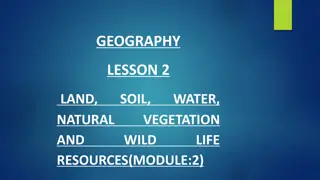Geospatial Comparison of Economic Change and Climate Disasters in Asia-Pacific
This study explores the impact of natural disasters on economic indicators in Southern and Western Asian countries over time, aiming to assist in policy-making by understanding the relationship between natural disasters and the economy. It discusses the increasing incidences of extreme weather event
4 views • 18 slides
Wild Coast N2 Biodiversity Offset Project Overview
In 2014, SANRAL initiated the N2 Wild Coast Biodiversity Offset project to conserve biodiversity in selected sites along the Wild Coast region. The project aims to protect and promote the unique biodiversity of these areas without introducing new species or disrupting local communities. Through acti
0 views • 11 slides
Understanding Natural Resources and Resource Economics
Economics of natural resources focuses on the supply, demand, and sustainable allocation of the Earth's resources. It aims to develop a sustainable economy that protects natural resources for future generations. Natural resources are essential for human survival and include biotic and abiotic resour
0 views • 11 slides
The Best Odie's Natural Oil for Enhancing Wood Furniture Beauty
Wood furniture has a timeless appeal, adding warmth and elegance to any space. To maintain and enhance its beauty, using the right oil finish is crucial. Among the various products available, Odie\u2019s Natural Oil stands out as one of the best natural oils for wood furniture. This blog will delve
1 views • 4 slides
Understanding Grazing Systems and Veld Types in Animal Production
This educational material covers various grazing systems, veld types, and the impact of different grazing animals on the vegetation. It discusses the importance of understanding veld types such as sweetveld, sourveld, and mixed-veld, and how factors like rainfall and soil texture influence these cla
0 views • 15 slides
Natural Vegetation and Wildlife Sanctuaries in India
The natural vegetation in India varies based on climatic and topographical factors, leading to diverse flora such as Evergreen Rain Forests, Monsoon Deciduous Forests, and Desert ecosystems. The Himalayas showcase vegetation changes with altitude, while factors like soil and topography influence veg
2 views • 39 slides
Understanding the Basic Concept of Human Rights in Modern Jurisprudence
Human rights are natural and inalienable, essential for human life, based on universal principles. The concept of human rights is both simple and complex, requiring societal development and political will for implementation. Rooted in natural law theory, human rights have evolved from natural law to
1 views • 24 slides
Major Vegetation of Pakistan - Overview and Characteristics
Vegetation in Pakistan varies from tropical forests to thorn forests, each with unique adaptations to the climate. Natural and local vegetation types like tropical dry deciduous forests and thorn forests are described, highlighting plant adaptations and environmental factors influencing growth.
0 views • 20 slides
Understanding Biomes: Climate, Vegetation, and Adaptations
Biomes are vast regions defined by climate, plant and animal communities. Factors like climate, geography, and vegetation impact the unique characteristics of each biome. Understanding biomes involves knowledge of climate, geography, vegetation adaptations, and animal diversity. Changes in one part
0 views • 23 slides
Understanding Podzol Formation in the Biosphere
Explore the formation of Podzol soil within the biosphere, including its distinctive characteristics and the factors influencing its development such as natural vegetation, climate, relief, soil organisms, drainage, and rock type. Gain insights into the relationship between Podzols and relief in reg
1 views • 17 slides
Understanding Sand Dune Vegetation: Citizen Science Survey
Conduct a vegetation survey to track changes in sand dune ecosystems over time. Monitor bare sand cover, vegetation types, plant species health indicators, and nutrient levels. Learn how to conduct the survey to help inform management decisions and preserve dune environments effectively.
0 views • 10 slides
Major Formation Types of the World by Dr. Zaryab Khalid - BS Botany Semester 7
This presentation by Dr. Zaryab Khalid explores the major formation types of the world in the field of community ecology. It delves into the classification of natural and cultural vegetations, the concept of formation classes and subclasses, and details the six natural formation classes along with e
2 views • 7 slides
Financial Strategy for National Strategy on Climate Change and Vegetation Resources
The Financial Strategy for the ENCCRV encompasses three phases - Preparation, Implementation, and Payment based on results, with a focus on addressing deforestation, forest degradation, and promoting sustainable vegetation management. Funding sources include international funds, private sector inves
0 views • 9 slides
Understanding Weeds: Origins, Impact, and Definitions
Weeds have been a persistent challenge in agriculture since ancient times, with origins stemming from both man's conscious efforts and natural plant invasions. This lecture delves into the impact of weeds on crop production and presents various definitions of weeds as plants growing where they are n
0 views • 10 slides
Exploring Kamloops: Landforms, Climate, Vegetation, and Environmental Issues
Discover the diverse landscape of Kamloops with its mountains, lakes, and unique vegetation. Learn about the hot summers and cold winters, ideal for activities like golfing and snowshoeing. However, forest fires pose a significant environmental issue, impacting animals, humans, and habitats. Explore
0 views • 9 slides
VELCO Vegetation Management Plan Overview 2021
Detailed analysis of the proposed vegetation management plan by VELCO for 2021, including comparisons between planned and actual units, herbicide usage by chemical and line, Rodeo usage by year, scheduled maintenance areas, and ultra-low volume foliar treatments. The data visualizations provide insi
0 views • 12 slides
Sustainable Management of Solar Farm Ground with Sheep
Utilizing sheep to manage vegetation at solar farms can reduce maintenance costs, carbon footprint, and reliance on herbicides. The natural grazing of sheep promotes a healthy ecosystem, stimulates the local economy, and provides a sustainable solution for solar farm ground cover.
0 views • 14 slides
Understanding Vegetation Dynamics with LPJ-GUESS Modeling
Explore the modeling of vegetation dynamics using LPJ-GUESS, covering stand to global scale approaches, management needs, and ecosystem-scale considerations. Discover the characteristics of ecosystem-scale modeling and the inputs and outputs of LPJ-GUESS for simulating vegetation dynamics.
0 views • 14 slides
Exploring Australia's Unique Physical Environments in Year 9 Geography
Dive into Year 9 Geography with a focus on Australia's physical landscapes and how people adapt to the challenges they present. Discover the continent's origins, major landforms, natural resources, and vegetation patterns. Uncover the perspectives on Australia's formation and explore the diverse ada
0 views • 35 slides
Understanding Biomes: Concept, Classification, and Factors
Biomes are large natural ecosystems encompassing plant and animal communities shaped by shared physical climates. They are classified based on climate, vegetation, soil-water, and heat availability, encompassing diverse environments like deserts, forests, savannas, and oceans. The concept of biomes
0 views • 6 slides
Understanding Natural Vegetation and Wildlife Resources
Natural vegetation and wildlife play a crucial role in the biosphere, providing essential resources and maintaining ecological balance. The interaction between the lithosphere, hydrosphere, and atmosphere creates the biosphere where living organisms thrive. Plants offer timber, oxygen, and other val
0 views • 16 slides
Understanding Soil Composition and Importance
Explore the world of soil and its significance as a natural resource by discovering its composition and how it affects plant growth. Learn about the main ingredients of soil, its permeability, and the role of water, air, and organic matter. Gain insights into how soil supports plant life through lea
1 views • 30 slides
Overview of Vegetation Index EDR Data Products and Team Members
This content discusses the JPSS STAR Algorithm and Data Products (ADP) Beta Review related to Vegetation Index EDR, including details on various data products, team members, beta maturity definition, and background of VI EDR product. It provides insights into the TOA-NDVI and TOC-EVI vegetation indi
0 views • 33 slides
Insights into Vegetation Dynamics and Function in Ecosystems
Explore the complexities of vegetation dynamics, composition, structure, and function in various ecosystems through discussions on disturbance, wetlands, hydrology, and ecosystem services. Engage in ongoing dialogues about vegetation classification schemas and practical methods like traits mapping t
0 views • 9 slides
Long-term Ecosystem Monitoring Project Status Report
The Long-term Ecosystem Monitoring Project, led by Diane Burbank, provides an overview of a 50-year monitoring effort focusing on the effects of broad-scale environmental changes. The project involves sampling soil, vegetation, lichen, and down woody material at 20 plots every 10 years. Site selecti
0 views • 12 slides
Understanding Global Ecosystems and Climate Influences
Global ecosystems are defined by dominant vegetation types and are influenced by factors like climate, atmospheric circulation, altitude, relief, and ocean currents. The distribution and characteristics of ecosystems are shaped by global atmospheric circulation patterns, creating distinct belts of v
0 views • 18 slides
Enhancing Utility Rights of Way with Integrated Vegetation Management
Integrated Vegetation Management (IVM) is a systematic approach that promotes low-growing plant communities to resist invasive tree species. It involves continual improvement through a cycle of information gathering, planning, implementation, and review. By employing IVM in utility rights-of-ways, o
0 views • 21 slides
Understanding Watershed Processes and Habitat Impact
Explore the intricate relationship between stream processes, watershed factors, and habitat effects on local wildlife. Learn how climate, geology, soil, vegetation, water, and land use play crucial roles in shaping ecosystems. Discover the importance of maintaining a healthy vegetative community for
0 views • 27 slides
Insights from Round Robin Science Lessons Learned
Discover the latest advances in science including insights on the arctic carbon budget, disturbance quantification, vegetation changes, permafrost modeling, and remote sensing processing workflows. Dive into the complexities of carbon mapping, water dynamics, vegetation responses, and trait algorith
0 views • 8 slides
Understanding Urban Heat Island (UHI) Effect - Causes, Impacts, and Solutions
The Urban Heat Island (UHI) effect, illustrated through images and descriptions, explores the formation of heat bubbles over cities, its causes like dark materials and vegetation loss, effects on clouds and rain, and comparison with heat waves. The issue, both anthropogenic and natural, is highlight
0 views • 26 slides
Conservation Plan for Aquatic Habitat Restoration in New Braunfels
This plan outlines various projects aimed at managing aquatic habitats in New Braunfels for the restoration and preservation of native species such as the fountain darter. It includes objectives like flow manipulation, non-native vegetation control, and restoration of aquatic vegetation in the Comal
0 views • 17 slides
Understanding Natural Language Data Processing
Exploring aspects of natural language data, covering topics like the differences between natural and formal languages, challenges in processing natural languages for machines, and examples of dealing with natural language data such as Yelp reviews. The content also touches on big data concepts, hash
0 views • 26 slides
Marine Aquaculture Impacts on Submersed Aquatic Vegetation
The document explores the impacts of structures and shading used in commercial shellfish mariculture activities on submersed aquatic vegetation, particularly seagrasses. It discusses the varying effects of mariculture structures on eelgrass density, productivity, and the potential habitat they provi
0 views • 11 slides
Monitoring Forest Cover Disturbances During Natural Hazards by Meteorological Satellites
Ecosystem functioning relies on energy, water, and carbon fluxes regulated by vegetation and soil properties. This study focuses on monitoring forest cover disturbances before, during, and after natural hazards using meteorological satellites. It involves analyzing land surface temperature, evapotra
0 views • 37 slides
Understanding LiDAR Backscattering and Vegetation Structure Analysis
Exploring the intricacies of LiDAR pulse backscattering in relation to vegetation structure analysis using photogrammetry-derived data. Discussing the technical aspects of pulsed LiDAR sensors, hot-spot view geometry, time-stamped photons, vicarious reflectance calibration, and challenges in radiome
1 views • 19 slides
Watershed Management: Concepts, Objectives, and Principles Explained by Mr. Anil Swami
Watershed management involves the rational use of land, water, and vegetation resources to optimize production while minimizing risks. Mr. Anil Swami emphasizes the importance of understanding soil and climate conditions, implementing water harvesting techniques, and practicing contingent crop plann
0 views • 14 slides
IMF Statistics Department - Natural Resources Statistical Tools
IMF Statistics Department has developed two statistical tools, the Revenue Template and National Accounts Template, to help countries analyze government revenues and natural resources in national accounts. These tools are crucial for policymaking in countries heavily reliant on natural resource reve
0 views • 9 slides
Understanding Various Types of Maps
Political maps use colors and symbols to represent countries, regions, and physical features. Physical maps highlight natural patterns and features like vegetation and mountains. Climate maps depict weather patterns, and land use maps show how land is utilized. Contour maps display elevation through
0 views • 18 slides
Biodiversity Mitigation in Victoria, Australia: A Case Study
Exploring the biodiversity offsetting system in Victoria, Australia, this case study focuses on the state's efforts to achieve Biodiversity Net Gain. The modules cover topics such as ecological vegetation classes, habitat condition scores, offset implementation, and the evolution of offsetting pract
0 views • 41 slides
Understanding Land and Natural Resources: Soil, Water, Vegetation, Wildlife
The lesson covers the formation of soil depending on factors like parent rock, relief, climate, time, and the role of flora, fauna, and microorganisms. It also explains the reasons for land degradation and methods of soil conservation including mulching, contour barriers, rock dams, and terrace farm
0 views • 29 slides


